2 November, 2023
Sustainable plastics take center stage at Guzmán Polymers’ Tech Day.
Last Wednesday, the Tech Day event of Guzmán Polymers took place at the Parc Tecnològic del Vallès in Cerdanyola (Barcelona), with the presence of around seventy professionals from the Catalonia region.
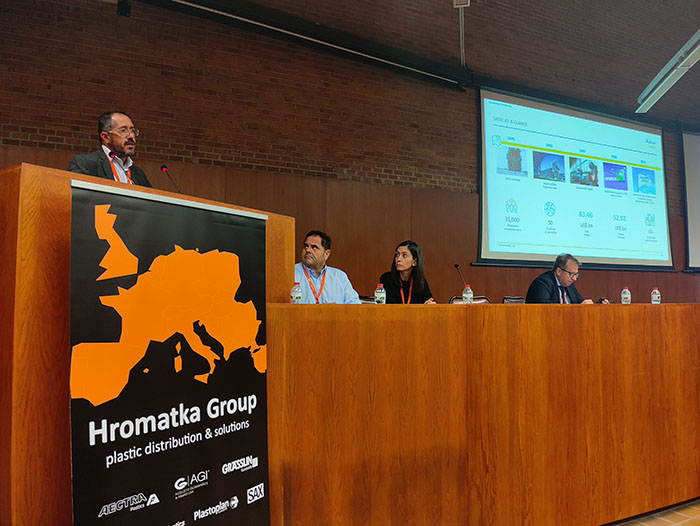
Sustainable Solutions
In this edition, Guzmán Polymers focused the theme of its Tech Day on sustainability, both in terms of plastic raw materials and machinery. Thus, during the morning, their raw material representatives showcased their sustainable polymers, while in the afternoon, the spotlight was on their sister company AGI, a specialist in plastics machinery.
Jaime Carcía, Managing Director of Guzmán Polymers, delivered the opening speech, welcoming the attendees and offering some insights into the company. He mentioned Guzmán Polymers’ membership in the Austrian group Hromatka since 2020, one of the European leaders in plastic product distribution, with 10,000 clients in 27 countries, 42 warehouses, and the main European distributor of SABIC.
Jaime García referred to Guzmán Polymers as a family business with a “passion for plastics” and whose goal is to be the preferred partner of its clients.
The New Scenario
The first session, led by Marta Pàmies and Jon Ander Ortube, technical managers of Guzmán Polymers, focused on discussing the current environmental scenario and the sustainable solutions offered by their company.
Pàmies started by mentioning the projected collapse of the planet by 2050. She emphasized that the current linear model of raw material consumption is not sustainable. Therefore, until then, the plastic industry must strive to change this model.
In this sense, plastic production generates a considerable amount of CO2, the main contributor to climate change, which is the main threat to humanity. For instance, to produce one kilogram of plastics, an average of 3.5 kilograms of CO2 is emitted into the atmosphere. Hence, the plastic industry set a common strategy in 2018 to decouple from fossil resources and reduce carbon emissions. The goal is to reduce emissions by 55% in Europe by 2030 and achieve carbon neutrality by 2050.
To address this, Guzmán Polymers currently offers two types of sustainable solutions: recycled products and biopolymers. In this regard, Jon Ander Ortube mentioned that Guzmán Polymers’ representatives currently offer alternatives to the most contaminating and environmentally impactful fossil-based plastics. He talked about recycled materials (mechanical, chemical, and biological recycling) and biopolymers (both biological and biodegradable).
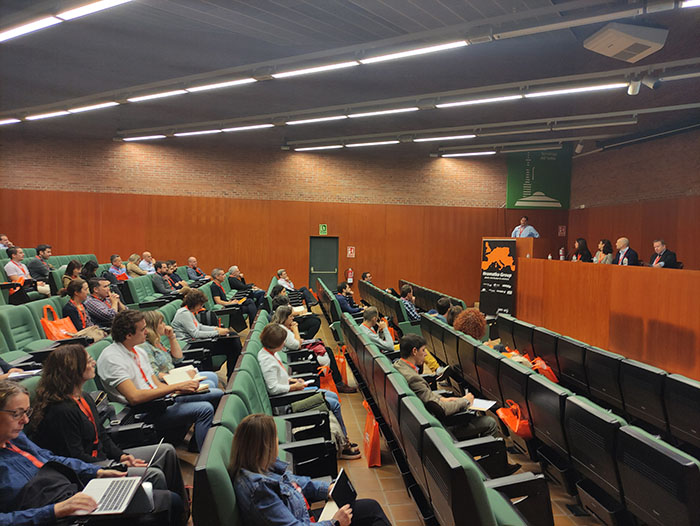
SABIC Products to Facilitate Recycling
The next presentation was delivered by Johana Pérez de Diego from SABIC Specialties. She focused specifically on the non-halogenated sustainable solutions that facilitate recyclability.
These solutions are part of SABIC’s sustainability strategy, which is based on three pillars: their own processes with less CO2, the development of circular products (with recycled and/or biological content), and products that are more environmentally friendly.
Related to this third point, Pérez de Diego mentioned SABIC’s efforts to launch solutions without PFAS (perfluoroalkyl and polyfluoroalkyl substances) or halogens. These substances are under scrutiny by authorities due to their possible toxicity, which could lead to potential bans. Moreover, PFAS and halogen-free materials are easier to recycle.
Among these SABIC solutions, their Lubriloy lubricants stand out. Also, Ultem resins, with properties of resistance to high temperatures and fire. Specifically, she mentioned Ultem Flexible, a non-halogenated flexible copolymer resistant to fire that serves as a sustainable alternative to fluoropolymers.
In this group, Noryl resins are worth mentioning for their good performance against hydrolysis and fire, as well as high dimensional stability, ideal for electrical products. She also pointed out the PC copolymers, without additives, which present good impact resistance and resistance to high temperatures.
Additionally, she referred to LNP compounds, with mechanical recycled content. The SLX range of SABIC’s PC copolymers received special mention, as they maintain good properties in outdoor environments and against UV radiation and aging. She also mentioned their PBT by chemical recycling from PET waste. This PBT maintains the same properties as fossil-based PBT and can be used for food contact applications.
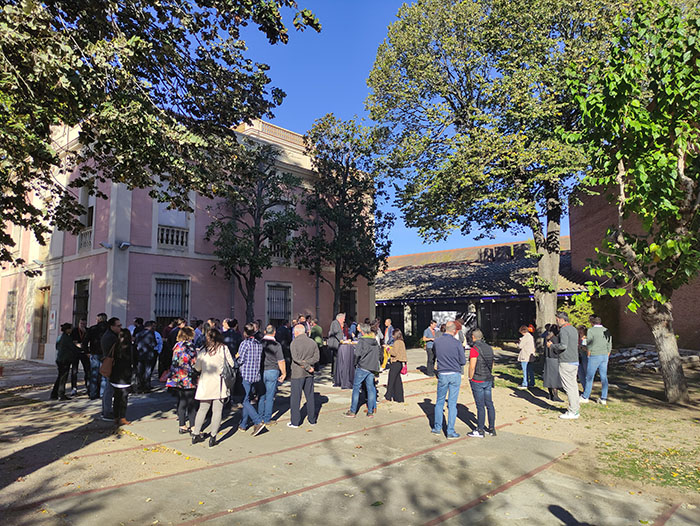
Circular Polyamides from DOMO
Xavier Victoria and Giovanni Spampatti from DOMO Chemicals mentioned the sustainable solutions offered by this Belgian manufacturer of polyamides, highly focused on automotive applications. Currently, 10% of their portfolio consists of recycled products, and by 2030, they expect this percentage to reach 20%. For Victoria, the key is to ensure the recycled material through partnerships. The automotive market is particularly increasing its demand for these types of solutions.
DOMO’s sustainability strategy, in addition to less resource-dependent production processes, relies on mass balance, life cycle analysis certificates of their products, and in some cases, EPD certification.
The product range that best summarizes DOMO’s efforts for sustainability is 4Earth, circular polyamides produced at the Arco plant in Italy from post-industrial waste. This plant has an annual production capacity of 10,000 tons of circular polyamides.
These are both PA6 and PA66 with very good mechanical properties from textile waste, such as airbags, and film. In some cases, they are reinforced with glass and carbon fiber, and even halogen-free. Spampatti provided examples of circular solutions for automotive, furniture, luggage, or baby strollers applications.
SABIC Trucircle
The next presentation was by Francisco Papis from SABIC and focused on the Trucircle solutions of the brand. Trucircle encompasses materials sustainability solutions. Working with customers to develop solutions with properties similar or better than fossil equivalents that extend the life of the parts to make them last longer and be even more sustainable.
Papis mentioned the five pillars of the Trucircle program. These include the development of mechanically recycled materials. Also, certified materials from chemical recycling, and non-fossil materials. Likewise, working on eco-design (designing products for recycling) and the closed loop (collaborating with companies to recover less abundant plastic waste, such as PC or PBT).
Moreover, SABIC Trucircle relies on mass balance, which certifies traceability, the amount of non-fossil raw material that a part contains. ISCC Plus is the entity that certifies it, ensuring that all actors in the value chain are equally certified.
Thus, for example, Trucircle materials, such as PC, can reduce CO2 emissions by up to 92% while maintaining the same properties as virgin materials.
Francisco Pupis explained the process of Trucircle circular materials from chemical recycling of pyrolysis oil from PCR and pointed out that SABIC is currently building a chemical recycling plant in the Netherlands that will serve as a model to be implemented worldwide. This way, the Saudi multinational will be able to achieve its goal of producing one million tons of Trucircle materials by 2030.
Regarding materials from mechanical recycling, the SABIC representative asked to somehow lower expectations, as not everything can be made from recycled material being sustainable, such as a nuclear white, for example, since these are partially degraded materials with additives that result in a starting compound with limitations for certain applications.
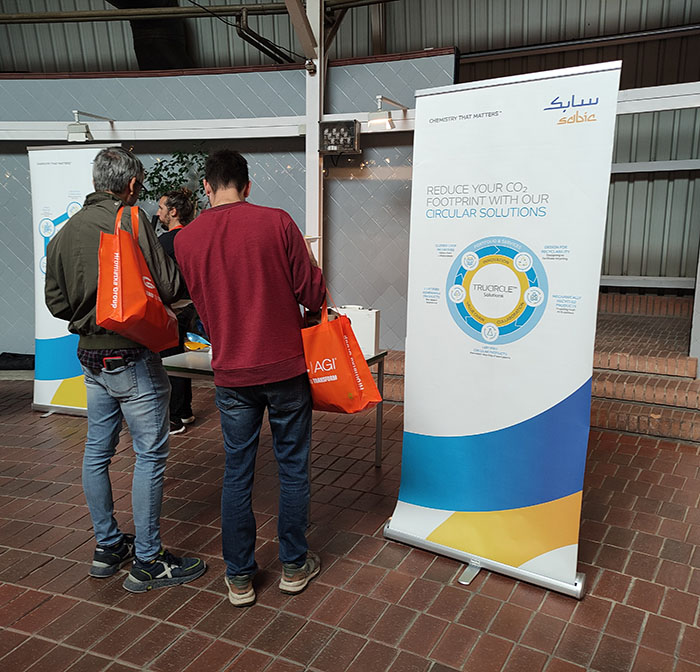
SABIC’s Sustainable Solutions for Electric Cars
SABIC’s sustainable solutions for electric mobility were the subject of the next conference, delivered by Eva Vidal. Vidal began her presentation by stating that from 2030, new cars must incorporate a minimum of 25% post-consumer recycled material. And of this figure, 25% (6-7% of the total) must come from other end-of-life vehicles. The regulation stipulates that this must be managed by the OEMs that market their cars in Europe (as well as Asian and American ones).
In this regard, Eva Vidal said that the increase in demand for recyclables by automotive OEMs is already being noticed. This underscores the importance of designing for recycling. Thus, for example, SABIC has monomaterial solutions that facilitate recycling. Another important issue in this market is the high demands on recycled material required by manufacturers, a challenge for material manufacturers. We are talking about the same properties as virgin materials, as well as processability, so that process parameters do not change with each batch of recycled material.
The SABIC representative commented that there are alternatives to recycled materials to reduce CO2 emissions, such as the use of renewable energies in production or the use of bio-based materials. She also mentioned foaming as a solution for weight reduction in automotive. Specifically, SABIC’s Core back technology allows weight reductions of up to 30%.
Along the same lines, Francisco Papis explained SABIC’s Bluehero initiative to contribute to vehicle electrification, especially concerning batteries.
Luxury Packaging Sector
The next presentation, by Elías Ariño from Avient, addressed the sustainable solutions that this plastics raw material manufacturer offers to the luxury packaging sector. This includes their Maxxam Rec and Gravi Tech Rec products, based on recycled PP.
Some of these products, through electroplating, achieve metalized effects similar to ABS but with a considerably lower carbon footprint. Avient also offers materials of biological origin, such as Maxxam Bio, and an alternative to formaldehyde-free POM, polyketone, which consumes CO2 during production.
New Partner for Recycled Materials
The last presentation of the morning was by Gabriel Buldú from the Valencian recycling company Paulowsky, recently incorporated into Guzmán Polymers’ portfolio.
Paulowsky specializes in the production of high-quality recycled PCR polyolefins. Their annual production will reach 9,800 tons this year, with a turnover of 9.5 million euros.
The company has invested more than 5 million euros in new machinery in the last three years, including
Paulowsky, certified by Eucerplast and Recyclass, expects to increase its production of recycled plastic in 2024 to 16,000 tons, with a turnover of 12.4 million euros.
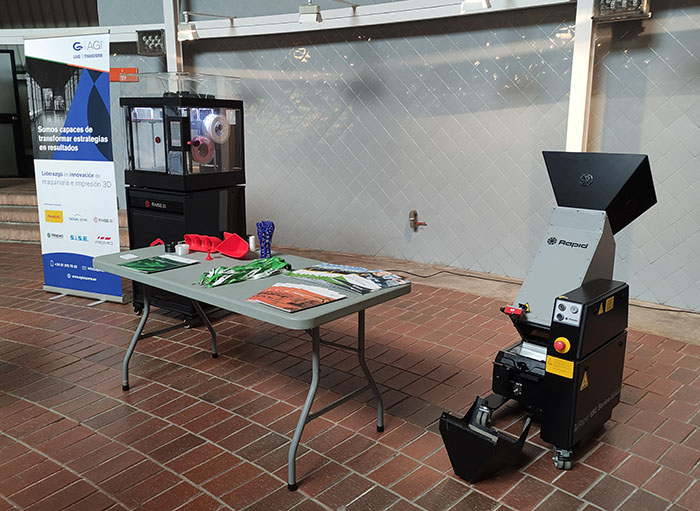
After the presentations, there was space for questions and debate, an interesting discussion that continued during lunch, in another setting with stands from some brands.
In the afternoon, it was the turn of AGI machinery, with presentations featuring Rapid Granulator mills, Fanuc injectors, and other equipment distributed by Guzmán Polymers’ sister company, characterized by their energy efficiency and productivity.